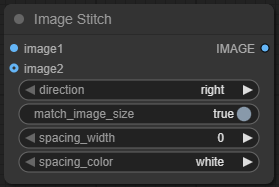Image Stitch
Category: comfy-core
Not to be confused with the WAS Node “Image Stitch.”
They share a name, but the WAS version is more like an artsy scrapbooker, while the comfy-core version is a blunt pixel-joiner that’s here to do one thing: slap two images together in a straight line.
🔍 Overview
The Image Stitch node in comfy-core lets you combine exactly two images into a single output image in one of four cardinal directions: right, left, down, or up.
Think of it as a no-nonsense, four-directional tape gun for images. There’s no blending, no magic AI seam-hiding — just pure “take these pixels and stick them next to each other” energy.

📁 Function in ComfyUI Workflows
You feed it two images, it outputs one stitched image.
You control:
- The direction of the stitch (placement of image 2 relative to image 1)
- Whether both images should be resized to match
- The spacing width between them (in pixels)
- The color used for that spacing
It’s perfect for before/after previews, comic panels, side-by-side comparisons, and other “I need these two images in one file” situations.
🧠 Technical Details
- Inputs:
image 1(IMAGE) – The base image.image 2(IMAGE) – The image to attach in the chosen direction.
- Output:
IMAGE– The resulting stitched image.
- Processing: Pixel-level concatenation with optional resizing and fixed-color spacing fill.
- Performance: Extremely fast — minimal GPU usage, negligible VRAM impact unless images are extremely large.
⚙️ Parameters & Settings (Deep Dive)
1. direction
- Type:
COMBO(Enum) - Options:
right→ Placesimage 2to the right ofimage 1.left→ Placesimage 2to the left ofimage 1.down→ Placesimage 2belowimage 1.up→ Placesimage 2aboveimage 1.
- Why It Matters: This completely changes the layout. If you’re aiming for a horizontal composition, choose
leftorright. If you want vertical stacking, chooseupordown. - Changing This Means: Get ready for a different aspect ratio and possibly a total visual composition shift.
2. match_image_size
- Type:
BOOLEAN(True/False) - True: Resizes both images so their shared edge dimensions match:
- For
left/right, both images will have the same height. - For
up/down, both images will have the same width.
- For
- False: Keeps original image sizes — which may result in mismatched edges.
- Why It Matters: Without this, stitching different-sized images will cause jagged or uneven seams.
3. spacing_width
- Type:
INTEGER(0 or more) - Function: Number of pixels between the two images.
- Effects:
- 0 → Images directly touch.
- Larger numbers → Creates a visible gap.
- Why It Matters: Helps create visual separation in comparisons or layouts.
4. spacing_color
- Type:
COMBO(Enum) - Options:
whiteblackredgreenblue
- Why It Matters: Ensures your spacing area is filled with a solid, intentional color. Prevents transparency unless you want the gap to scream “unfinished.”
💡 Recommended Use Cases
- Before/After Comparisons – Prompt changes, model swaps, or style shifts.
- Side-by-Side Evaluations – Model A vs Model B.
- Storyboarding / Panels – Simple, clean layouts.
- Reference Prep – Combine inspiration images in a set order.
🛠 Workflow Setup Example
- Connect
image 1andimage 2outputs from generation nodes. - Add Image Stitch node and wire both inputs.
- Choose
direction(right, left, down, up). - Toggle
match_image_sizeON if you need perfect alignment. - Set
spacing_widthandspacing_colorto taste. - Save or send to next node in the workflow.
🧾 Prompting Tips
- When planning to stitch, generate both images with matching dimensions — it avoids resizing artifacts.
- Use spacing to visually clarify “this is two separate renders” when comparing results.
- If you want invisible seams, set spacing to 0 and ensure colors match at the join.
🔥 What-Not-To-Do-Unless-You-Want-a-Fire
- Don’t feed it only one image — this is not the “lonely painter” node.
- Don’t expect it to “blend” — it’s a cut-and-paste machine, not a Photoshop wizard.
- Don’t stitch ultra-high-res images without enough RAM unless you like crashes.
- Don’t confuse this comfy-core node with the WAS Node Image Stitch — they are not interchangeable.
- Don’t set spacing color to something obnoxious unless your goal is to blind viewers.
⚠️ Known Issues
- Aspect Ratio Changes: Direction changes can drastically alter output proportions.
- Resizing Softness: With
match_image_sizeON, resizing may cause slight image softening. - Limited Colors: Only 5 preset spacing colors available — no custom hex/RGB.